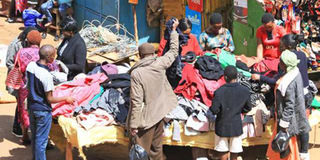From Meru to Kirinyaga, the economy hurts

Customers buy second hand clothes on Gakere Street in Nyeri town. Many families can no longer afford new clothes, citing hard economic times. PHOTO | FILE | NATION MEDIA GROUP
What you need to know:
- In Embu, Mr Samuel Kanyi, a butcher, says life has not been easy.
- Mr Kanyi’s greatest fear is that he may close down the butchery.
Godfrey Thuranira, a businessman in Meru, is among the owners of small enterprises who have been battered by the current state of the economy.
The clothes seller says the number of customers has dwindled significantly.
“At the end of every month two years ago, the sales were good. These days, a month ends and another starts but there is no difference. It is as if people don’t get paid,” he said.
Mr Thuranira adds that he has cut down on luxuries.
“You cannot stop buying food but I spend very little on drink,” the father of two said.
He added that the demonetisation of the Sh1,000 note has made matters worse.
NO MONEY
“There is no money. I did not make a single sale in the first three days of the month,” he said.
The story is not different for spare part dealers.
When Ms Esther Njoroge took the decision to open a car spares shop in Naivasha in 2016, she was full of hope.
Ms Njoroge invested Sh600,000 in the business and topped up with Sh400,000 the following year.
With a monthly house rent of Sh15,000, she hoped to break even quickly and start making profits. Six months later, she was struggling to pay rent.
“My friends encouraged me to hang on, saying it is normal for a new business to struggle. I listened and soldiered on,” she recalled.
“In the third year, I was struggling to restock. The shelves were almost empty.”
Sensing danger, she sold the shop.
MAKING LOSSES
“I was making huge losses so I sold the shop for Sh180,000. The business was no longer viable,” she added.
Four other people who had similar outlets in the area also closed shop. Mr Mwangi Githua, another shop owner in Naivasha, says things are not looking up.
In Embu, Mr Samuel Kanyi, a butcher, says life has not been easy. His income has stagnated in the past one year. Mr Kanyi says his annual operating cost is Sh1.3 million against Sh1 million profit.
"People are buying less meat and business is not doing well," he said.
Mr Kanyi also used to operate a hotel but closed it down due to lack of customers. He has started rearing chickens and growing vegetables to supplement his income.
His vehicle was almost auctioned when he failed to service a Sh1.5 million bank loan.
“I had to ask for assistance from friends,” he said.
The family has cut on expenses. He, his wife and children do not buy new clothes or travel much. Mr Kanyi’s greatest fear is that he may close down the butchery.
“The many taxes on almost all goods weigh heavily on Kenyans,” he said. “Some families cannot afford three meals a day."
After five years of joblessness, Mr King’ori Kabuya decided to start an animal feed enterprise in Kagio, Kirinyaga County.
The electrical engineering graduate started the business three months ago after searching on the internet.
“Our education system encourages job searching and being good employees. It does not emphasise job creation,” he said.
Mr Kabuya took a Sh75,000 loan from his brother and has been marketing his products to farmers in Nyeri and Kirinyaga.
DESPERATION
“I did this out of desperation,” said Mr Kabuya, who has become a household name in his locality.
Recently, he got an order to supply a Kerugoya agro vet shop but it was cancelled since he lacks an electronic tax register machine.
He makes supplements for dairy cows.
After graduating from Nyandarua National Polytechnic in 2014, Mr Kabuya survived on menial and casual jobs.
In Narok, wheat farmers say their incomes have shrunk by at least 40 per cent.
Some have abandoned growing wheat or reduced the acreage in favour of maize and potatoes, whose cost of production is lower.
Mr Duncan Totona, a large-scale farmer in Ololulunga, says the high cost of growing wheat and poor prices have led many locals to start producing other crops.
Mr Totona reduced the land under wheat from 250 acres to 20 this season. Ordinarily, he makes Sh2,800 per bag, harvesting about six bags per acre.
“Producing wheat per acre needs Sh50,000. It makes no economic sense,” he said.
Mr Moses ole Kupees, a farmer Melili, says the high cost of living has seen his family make lifestyle adjustments.
Reports by Joseph Wangui, Macharia Mwangi, George Sayagie, George Munene




